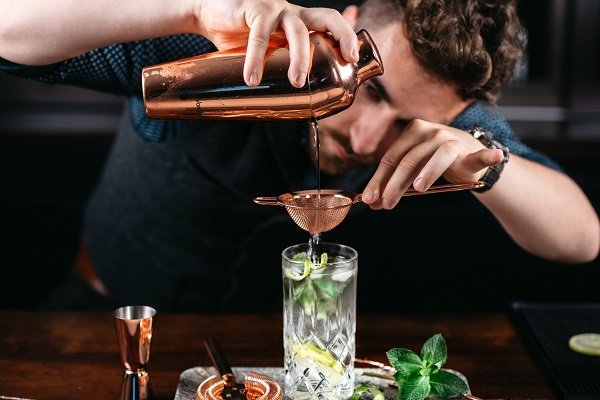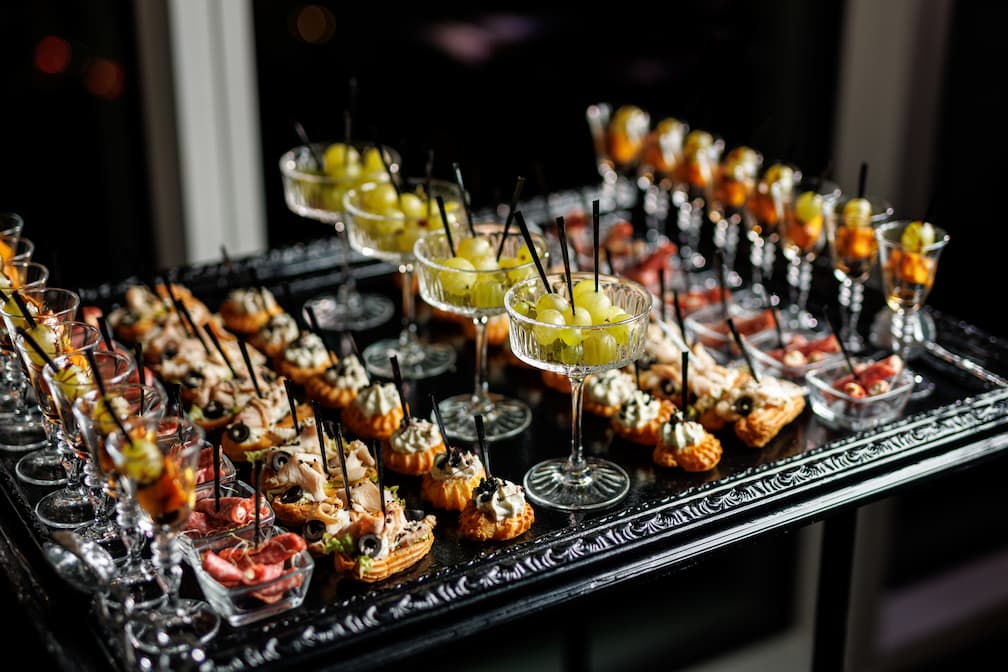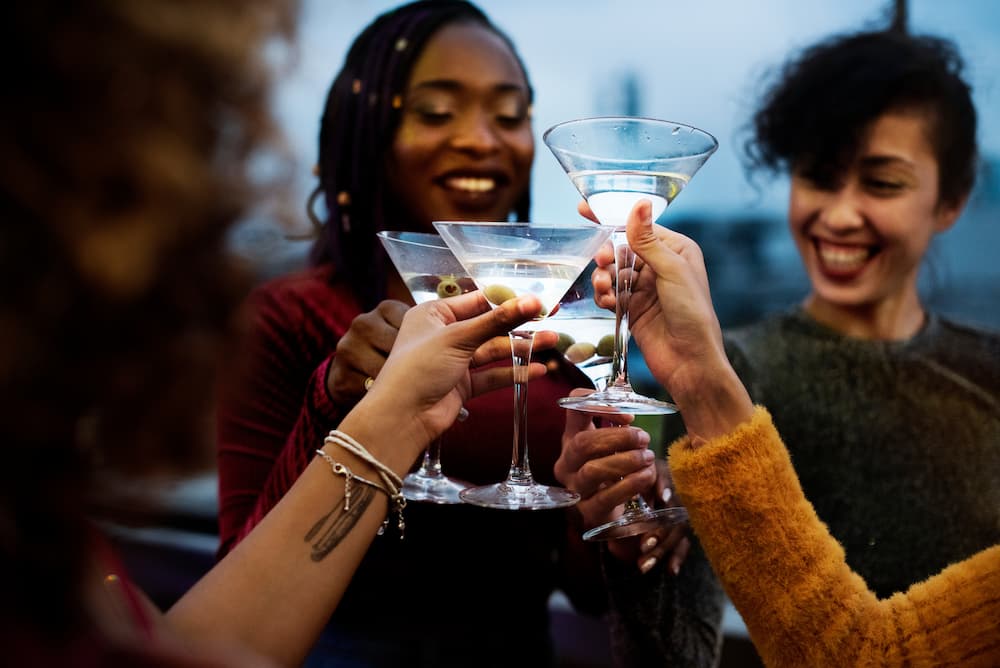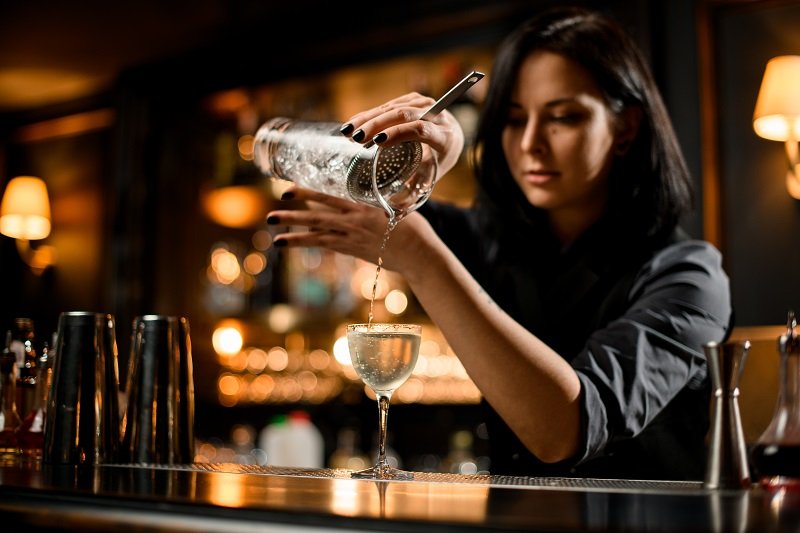Mixologist vs Bartender – What’s the Difference?

Table of Contents
- Mixology and the Role of Mixologist
- The Role of Bartender
- Mixologist vs. Bartender: A Symphony of Skills and Expertise
- The Similarities in the Journeys of Mixologists and Bartenders
- The Adventurous Spirit: Mixology’s Global Quest
- Embracing Innovation: Technology and the Mixology Renaissance
- Conclusion: Uniting Passion and Flair in a Symphony of Libations
Mixologists and bartenders are two captivating personas that conjure liquid wonders behind the bar. While both are creators of delectable libations, they dance to different beats, each with unique artistry and flair.
Mixology and the Role of Mixologist
Mixologists, the mystical alchemists of mixology, embark on a magical journey with flavors and spirits in hand. Imagine a symphony of history, techniques, and a dash of chemistry—harmoniously crafting liquid poetry that dazzles the taste buds. At the heart of this enigmatic craft stands the mixologist, not just a mere cocktail maker but a true artist who conjures one-of-a-kind concoctions with a stroke of creativity. Armed with an arsenal of spirits, liqueurs, bitters, and syrups, they wield their knowledge like sorcery, even concocting their magical ingredients. But it’s not just about the ingredients. It’s the stories they tell with each sip—their drinks are canvases painted with flavors, colors, and fancy presentations. Every cocktail they create is a masterpiece, leaving imprints of wonder and delight on the palate.
Mixology, the art of crafting mixed drinks, especially cocktails, is not confined to the walls of bars and restaurants. Beyond the glimmering bar counters, mixologists venture into diverse realms, collaborating with renowned chefs to create extraordinary dining experiences. They craft bespoke cocktail pairings that elevate the flavors of each dish, turning a meal into a symphony of taste sensations. Moreover, mixologists leave their mark on the entertainment world, dazzling audiences at exclusive events, galas, and award ceremonies. With flair and showmanship, they shake and stir on grand stages, delighting guests with signature cocktails that perfectly capture the essence of the occasion.
For decades, mixologists like the esteemed Dale DeGroff have delved into the origins of iconic cocktails, delving into the archives of bartending legends and reviving forgotten recipes with a contemporary twist.
The Role of Bartender
In contrast, the bartender strides into the scene with an air of effortless charm, an orchestra conductor of liquid revelry. Efficiency and hospitality are their forte, gracefully orchestrating high-volume service while maintaining top-notch quality and speed. An encyclopedia of cocktail recipes lies within their grasp, allowing them to craft delicious libations, pour beers, and serve wines with fluid grace. They are the maestros of multitasking, skillfully engaging with patrons, taking orders, and ensuring a welcoming ambiance at the bar. Their expertise goes beyond mixology, encompassing a spectrum of spirits, recipes, and drink preparation techniques. Each interaction with a bartender is a symphony of delightful service, where every guest is treated to a seamless and enjoyable drinking experience.
While bartenders like Salvatore Calabrese excel in efficiently serving a wide variety of beverages, they also weave stories behind the drinks, regaling patrons with tales of the Negroni’s birth in an Italian café and Manhattan’s origin amid the bustling streets of New York City.
Mixologist vs. Bartender: A Symphony of Skills and Expertise
While mixologists and bartenders share a passion for crafting beverages and providing excellent service, their approaches and areas of expertise differ. Yet, amidst their differences, these two enchanting personas share a common goal—to create unforgettable moments and experiences through the enchantment of liquid delights. Whether it’s the mixologist’s symphony of flavors or the bartender’s impeccable service, both play a vital role in shaping the memories that guests carry with them long after the final sip.
Below are some distinct differences between mixologists and bartenders.
- Duties and Responsibilities
Mixologist: The primary focus of a mixologist is creating new, sophisticated, and intricate cocktails that showcase their creativity and knowledge. They design unique cocktail menus, experiment with ingredients, and incorporate cutting-edge techniques to develop signature drinks for their establishments. Additionally, mixologists often collaborate with kitchen staff to ensure that their cocktail offerings complement the overall dining experience.
Bartender: Bartenders handle a more comprehensive array of responsibilities, including serving beer, wine, and simple mixed drinks, in addition to preparing cocktails. They manage inventory, maintain bar cleanliness, and engage with customers, taking orders and ensuring a pleasant environment for guests. Bartenders also possess a solid understanding of classic cocktails and can mix them with precision and speed.
- Skills and Expertise
Mixologist: To become a skilled mixologist, one needs a deep knowledge of spirits, cocktail history, and drink preparation techniques. Creativity, a keen palate, and the ability to experiment with flavors are essential traits for a mixologist. Mastery of techniques like shaking, stirring, muddling, and garnishing is crucial to crafting visually appealing and well-balanced cocktails. Moreover, mixologists may delve into molecular mixology to incorporate innovative textures and presentations in their drinks.
Bartender: Bartenders must excel in customer service, communication, and multitasking. Speed and accuracy in serving beverages are essential, especially during busy hours. They should have an excellent memory to recall various drink recipes quickly. While a solid knowledge of cocktails and spirits is beneficial, bartenders often focus on efficiently serving a wide range of drinks.
- Salaries and Earnings
Mixologist: As mixology is a specialized field that demands creativity and expertise, mixologists may command higher salaries than bartenders. Experienced mixologists working in high-end bars, restaurants, or luxury hotels can earn significantly higher incomes, especially if they have developed a reputation for crafting exceptional cocktails.
Bartender: Bartenders’ salaries can vary widely depending on the type of establishment, location, and level of experience. While some bartenders receive hourly wages plus tips, others in upscale establishments might earn a base salary with more significant gratuities. Generally, bartenders’ earnings may be lower than those of mixologists due to the broader nature of their roles.
The Similarities in the Journeys of Mixologists and Bartenders
For the mixologist, the stage is a world of endless possibilities. Armed with a palette of spirits and an imagination that knows no bounds, they set out to craft the perfect drink—exploring, experimenting, and creating new realms of flavor. It’s a journey of constant discovery as they explore the balance between sweet and sour, the infusion of herbs and spices, and the artful presentation that delights both the eyes and the taste buds. In every pour, they are storytellers, and their cocktails are the tales they weave—whisking us away to distant lands, immersing us in history, and creating memories that last a lifetime.
Likewise, the bartender brings their own magic to the stage—the magic of genuine connection. With a charming smile and a warm welcome, they create an atmosphere that feels like coming home. The bar becomes a place of camaraderie, where strangers become friends, and worries are washed away with each sip. With effortless grace, they navigate the dance of service, attending to every need and desire, making sure every guest feels unique and valued. They’re masters of conversation, offering a listening ear and a comforting presence. Beyond the drinks, they create moments of joy, laughter, and celebration—becoming the heart and soul of the bar.
But beyond their roles within the bar’s domain, mixologists and bartenders often find themselves woven into the rich tapestry of history and culture. The cocktail, a delightful fusion of spirits and flavors, has a storied past that stretches back centuries. From the classic concoctions that grace the pages of cocktail manuals to modern innovations that push the boundaries of mixology, each drink bears a unique tale.
For the mixologist, it’s a journey of discovering the origins of iconic cocktails, delving into the archives of bartending legends, and reviving forgotten recipes with a contemporary twist. Every cocktail on their menu becomes a tribute to the past, a celebration of the cocktail’s illustrious heritage, and a testament to the mixologist’s skill in preserving tradition while adding a touch of modernity.
Likewise, the bartender is familiar with the stories behind the drinks. They regale patrons with tales of the Negroni’s birth in an Italian café, Manhattan’s origin amid the bustling streets of New York City, and the Mojito’s Cuban roots. Behind each drink lies a narrative of cultures colliding, trade routes expanding, and historical figures indulging in the pleasures of libations.
The Adventurous Spirit: Mixology’s Global Quest
Beyond the boundaries of the bar, mixologists and bartenders often embark on journeys to distant lands, venturing into the heart of new cultures and seeking inspiration from global flavors and ingredients. They are the intrepid explorers of the cocktail world, on a quest to discover the hidden gems of mixology that await in every corner of the globe.
The world of mixology and bartending is a captivating tale of passion, creativity, and camaraderie. This story continues to unfold with every cocktail crafted and every moment shared. From the mixologist’s artistic vision to the bartender’s warm embrace, both personas intertwine to create an enchanting experience for all who enter their realm.
Embracing Innovation: Technology and the Mixology Renaissance
In the ever-evolving landscape of mixology and bartending, technological advancements play a growing role in shaping the industry. Mixologists and bartenders embrace innovation, using cutting-edge tools and gadgets to enhance their craft. Technology opens up a world of possibilities for creating unparalleled drinks, from smoke infusers and sous-vide techniques to liquid nitrogen for instant chilling. Moreover, in the digital age, social media has become a powerful platform for mixologists to showcase their creativity and connect with enthusiasts worldwide. Online platforms have given rise to virtual cocktail classes and masterclasses, enabling aspiring mixologists to learn from industry experts from their homes.
Conclusion: Uniting Passion and Flair in a Symphony of Libations
In conclusion, mixologists and bartenders play integral roles in the food and beverage industry, each contributing unique skills and expertise to drink-making and hospitality. While the lines between these two captivating personas may sometimes blur, they share a passion for crafting exceptional libations and creating unforgettable experiences for their patrons. Interestingly, some mixologists prefer to avoid labeling themselves as such, finding the term fancy and unnecessary. They are content with the bartender title, even though they go beyond the traditional role by actively engaging in recipe creation and mixology. Ultimately, whether one identifies as a mixologist or a bartender often comes down to personal preference, but what remains undeniable is the magic and artistry they bring to the world of beverage symphonies. Cheers to these true magicians and maestros of liquid dreams!
Frequently Asked Questions
Check out the most frequently asked questions!
What skills are essential for a mixologist?

Mixologists require deep knowledge of spirits, cocktail history, and drink preparation techniques. Creativity, a keen palate, and the ability to experiment with flavors are crucial, as well as mastery of various cocktail techniques.
What skills are important for a bartender?

Bartenders excel in customer service, communication, and multitasking. Speed and accuracy in serving beverages, memory for drink recipes, and a solid knowledge of cocktails and spirits are important.
What are the key differences between a mixologist and a bartender in terms of their roles and responsibilities?

Mixologists focus on creating intricate cocktails with innovative ingredients, often collaborating with chefs to enhance the dining experience. They craft unique drink menus and prioritize creativity. Bartenders have a broader role, handling various drinks, managing inventory, and ensuring a welcoming bar atmosphere.






